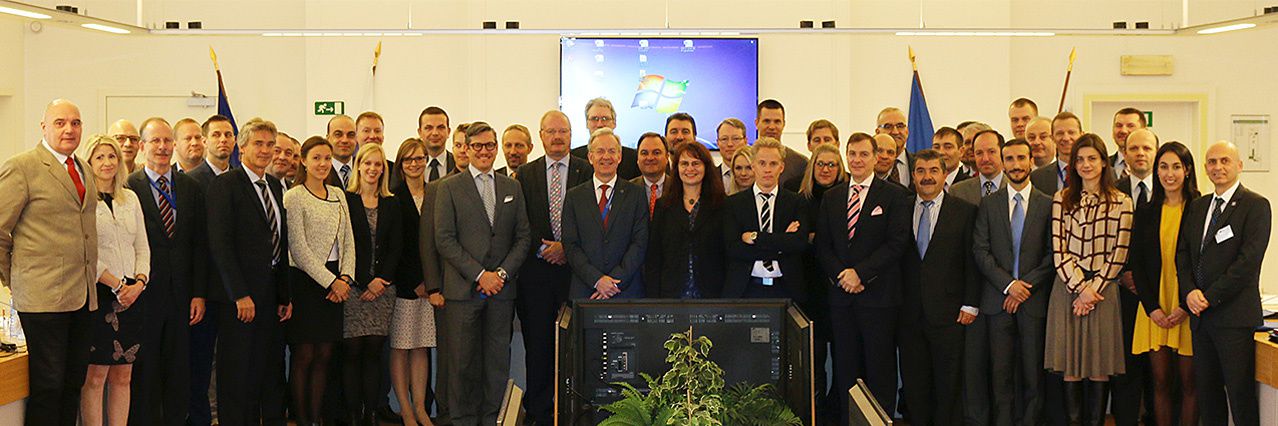Brussels - 27 October, 2015 European Defense Agency
From 27 to 29 October 2015, an Awareness Level Module of the European Armament Cooperation Course (EAC) is taking place at the European Defence Agency’s premises. Organised by the European Defence Agency (EDA), the European Security and Defence College (ESDC) and the Austrian Ministry of Defence (MOD) and Sports, the course has attracted the highest number of attendees in its four-year history. Forty-six enrolled students represent thirteen EDA Member States, the European Commission, European External Action Service (EEAS) and Organisation for Joint Armament Cooperation (OCCAR).
The aim of the EAC course is to enhance mutual understanding of the armaments cooperation issues and to serve as a useful networking platform to foster and harmonise armaments cooperation among the Member States. Most of all, it addresses junior personnel who need to gain knowledge and experience in international acquisition and project management. The course also complements the curriculums of available national courses. “We believe that the practitioners who work in national and international armament cooperation can highly profit from the course. We are able to provide them with practical knowledge and understanding of the armament sector along with its frameworks, the stakeholders’ tools and processes as well as challenges and benefits available at the EU level,” says Massimo Guasoni, the EDA Head of Unit Education, Training & Exercise.
Towards Europe’s strategic autonomy
Rini Goos, the EDA Deputy Chief Executive, welcomed the course participants and, in his speech, he pointed out the key elements for European strategic autonomy and freedom of action: “Apart from working on capabilities, first of all, we must strive to enhance investment in traditional defence research, particularly in collaborative Research & Technology. Secondly, we need a sound European industrial policy. Thirdly, I would like to mention standardisation: a pan-European standardisation approach is the key to increase European competiveness on a global scale and to strengthen the European Defence Technological and Industrial Base Strategy; it is also the main driver for interoperability. And last but not least, civil-military ‘dual-use’ synergies need to be better exploited. It is only if we move ahead along these four strands of work that Europe will be able to attain strategic autonomy and become a security provider rather than a security consumer”.
Dr Wolfgang Sagmeister from the Austrian MOD being the Course Director will make sure that all the course objectives will have been met. The topics on the agenda are much varied and include the presentations of the EDA and the ESDC; military dimension of the Common Security and Defence Policy; EU military capability development along with the EDA Capability Development Plan, current trends in military defence capability development; intercultural aspects in international cooperation; EU Defence policies in a wider context, and other.
The EAC course traditionally comprises two parts: an Awareness Level Module taking place in Brussels, and an Expert Level Course, which will be held from 23 to 27 November 2015 in Warsaw, Poland. However, in order to attend the course, it is mandatory to complete an Internet-based Distant Learning (IDL) module offered by the ESDC.
Shaping an educational platform
Since 2006, the EDA had been working towards establishing a proper training frame in response to the growing needs for harmonised education in the armament acquisition field. In 2009, the Czech Republic’s EU Presidency supported the creation of a new European armaments cooperation course, providing an EU-wide training platform where a common understanding of a European approach to armaments cooperation could be promoted. The EDA Member States welcomed the initiative and later that year the EDA Steering Board, in the National Armaments Directors configuration, approved the top-level European Armaments Cooperation (EAC) Framework, under which the current course was established.
In 2013, thanks to the initiative of Austria and other like-minded countries, including the Czech Republic, Germany, Sweden, and the United Kingdom, the course took its current form. It followed the success of the pilot European Armaments Cooperation Course organised in Brussels and Stadtschlaining in 2012.
More information:







